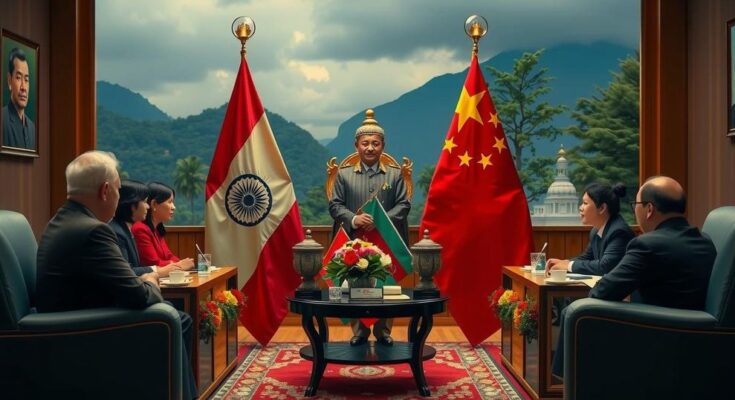India’s Defence Minister Rajnath Singh and China’s Admiral Dong Jun held productive talks in Laos, agreeing to create a roadmap for rebuilding mutual trust post-recent military disengagement. The ministers emphasized the importance of cooperation over conflict, reflecting on the lessons from the 2020 border clashes.
On Wednesday, Defence Ministers Rajnath Singh of India and Admiral Dong Jun of China held significant discussions in Vientiane, Laos, aiming to establish a “roadmap” for rebuilding mutual trust between the two nations. The meeting took place on the sidelines of a regional security conference, following recent disengagement efforts by their respective militaries in eastern Ladakh after long-standing tensions. Singh emphasized that amicable relations between the two largest countries in the world would be beneficial for global peace and prosperity and recommended learning from past border clashes to prevent future conflicts. During the dialogue, Singh underscored the importance of shifting focus from conflict to cooperation. He expressed the hope that increased trust and confidence could be established between India and China through de-escalation. Both countries acknowledged the need to address lessons from the 2020 border clashes while agreeing to collaborate on a framework for enhancing mutual understanding. Before these talks, India’s External Affairs Minister S. Jaishankar met with his Chinese counterpart Wang Yi at the G20 summit in Rio de Janeiro, reiterating the importance of next steps in India-China relations, including various initiatives such as the resumption of the Kailash Mansarovar Yatra. Indian and Chinese military leaders completed disengagement operations following prolonged negotiations. Singh’s visit to Vientiane also included meetings with Defense Ministers of Laos and Malaysia. The ongoing reshape of dialogue mechanisms between India and China aims to normalize relations, which have been contentious since military confrontations began in 2020, particularly the severe skirmish in the Galwan Valley. India’s stance remains that relations with China necessitate peaceful conditions along their shared border. This recent dialogue signals a concerted effort to mend ties after years of significant strain, suggesting a potential thaw in relations if both parties continue to engage constructively.
The relationship between India and China has experienced significant strains due to several border conflicts over the years, most notably the violent confrontation in the Galwan Valley in June 2020. This incident marked the most severe military clash between the two nations in decades, leading to heightened tensions and militarization along the Line of Actual Control (LAC). Since then, diplomatic and military engagements have been sporadic, with various meetings aiming to ease the standoff and promote dialogue. The meetings between ministers from both countries signal a willingness to focus on constructive engagement and cooperation.
In conclusion, the productive talks between India and China’s defence ministers highlight an optimistic trend towards rebuilding trust and cooperative relations following a period of intense conflicts. Both nations recognize the essentiality of peaceful interactions for regional stability. The outcomes of these discussions may set the foundation for future diplomacy, facilitating more effective management of their complex relationship and potentially leading to broader cooperation in various sectors.
Original Source: www.hindustantimes.com




